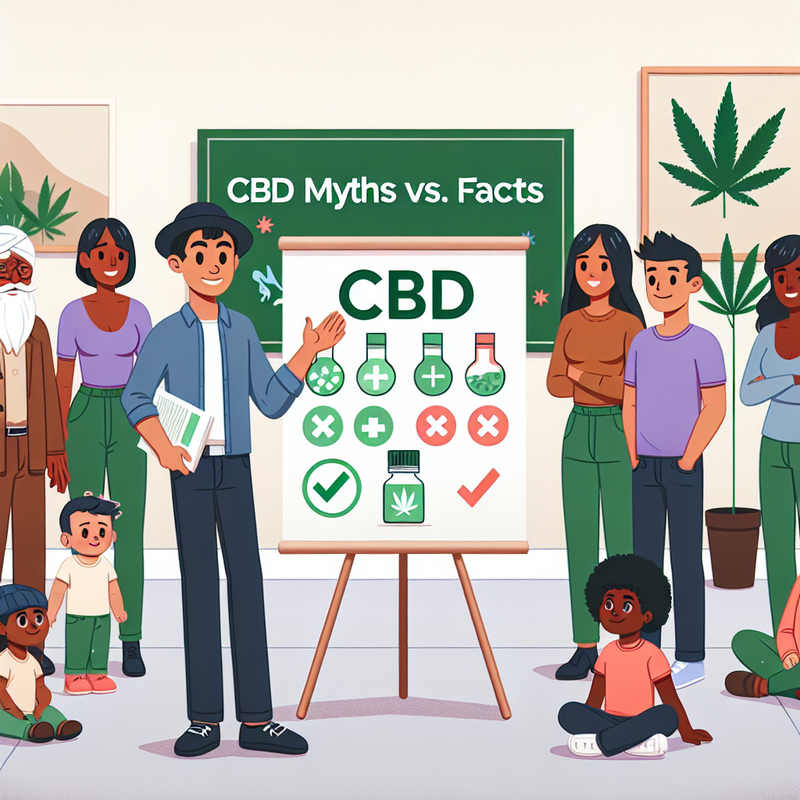
Common CBD Misconceptions: Breaking Down the Myths
In recent years, CBD (cannabidiol) has surged in popularity, becoming a go-to product for individuals seeking relief from pain, anxiety, and a myriad of other health issues. However, despite its growing acceptance, there are still many misconceptions surrounding CBD. In this article, we aim to break down these myths and provide you with accurate information to help guide your CBD journey.
Myth 1: CBD Gets You High
One of the most pervasive myths about CBD is that it produces a psychoactive effect similar to that of THC (tetrahydrocannabinol), the compound found in marijuana that causes a high. The truth is that CBD is non-psychoactive, meaning it does not alter your state of mind or impair your ability to function. This is one reason why CBD oil and other CBD products are legal in many places where THC remains illegal.
Myth 2: CBD is Just a Trend
While it’s true that CBD has gained a lot of attention in the last few years, it’s rooted in a longstanding history of use. Hemp has been utilized for its medicinal properties for thousands of years. Modern research is shining a light on its potential benefits, helping to establish CBD as more than just a passing trend. With new studies continuously emerging, CBD's role in wellness is becoming increasingly significant.
Myth 3: All CBD Products are the Same
Not all CBD products are created equal. There are different types of CBD extracts—full-spectrum, broad-spectrum, and isolate—which influence their efficacy and effects. Full-spectrum CBD contains all cannabinoids found in the cannabis plant, including THC (in trace amounts), while broad-spectrum excludes THC but retains other beneficial cannabinoids. CBD isolate is the purest form of CBD, containing no other cannabinoids or compounds from the plant. When selecting a product, it's imperative to understand these differences to find what works best for you.
Myth 4: CBD is Dangerous or Illegal
As long as the CBD is derived from hemp and contains less than 0.3% THC, it is federally legal in the United States. However, legality can differ between states, so it's essential to check local regulations. Moreover, when sourced from reputable brands, CBD products are generally considered safe. Many users report minimal side effects, and any potential negative impacts are often mild, such as fatigue or changes in appetite. Of course, consulting a healthcare professional is always advisable before beginning any new supplement.
Myth 5: You Can’t Overdose on CBD
While it is highly unlikely to overdose on CBD, it is possible to consume too much. Users may experience symptoms such as nausea, diarrhea, or excessive drowsiness if they take more than their body needs. It’s crucial to start with a low dose and gradually increase it while monitoring your body’s response. This approach allows you to find the optimal dosage without overwhelming your system.
Myth 6: CBD Doesn’t Work for Everyone
CBD can affect everyone differently—a fact often overlooked. While many users find relief from symptoms such as chronic pain, anxiety, and insomnia, others may not feel the same effects, and that’s completely normal. Factors such as individual body chemistry, the quality of the CBD product, and the method of consumption all play a role in how effective CBD will be for each person.
With so much misinformation out there, it's no wonder that myths surrounding CBD persist. At our CBD online store, we prioritize educating our customers about the benefits and realities of CBD. We believe that informed consumers are empowered consumers. Whether you're looking for CBD oil, pre-rolls, or other products, don't let misconceptions hold you back from finding relief or enhancing your wellness journey. Visit us today to explore our range of quality CBD products and embark on your path to better health!

